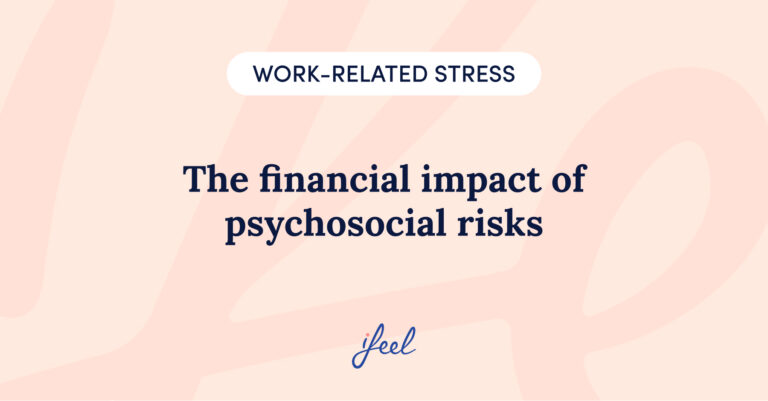Public speaking can be intimidating to many people, leading us to ask the key question: how to get over public speaking anxiety? This aspect (whether it plays a consistent part in your job role or not) can affect your mental health at work, especially if you are not very confident speaking to a large audience, or if you have to do it in another language.
This is a normal reaction that you will not always be able to “overcome” completely… and you don’t need to either. Remember this comes from people who know you should not waste your energy on fighting something which is impossible; and in life, there are two things that are impossible: making the wind stop, and making your body completely calm when you are speaking in public.
Therefore, it is important to know you can’t do both: lower your anxiety to zero as well as do a 10-slide presentation because you still need to do the 10-slide presentation. What you can do is achieve, with relevant training, a state of mind in which you can handle a level of elevated alertness properly. It is normal to feel fear accompanied by catastrophic thoughts of how bad you will do. But don’t panic, learning how to get over public speaking anxiety is more common than you think.
How to overcome public speaking anxiety
Some people have the gift of public speaking and some of us do not share the same gift! However, both types of people can use some simple tricks to contain anxiety before a presentation and, who knows, may also make you do it better than what you expected. Put them into practice during upcoming presentations and, if you see that it is not enough or you feel that there is something that keeps blocking you too much when it comes to speaking in public, speak to a professional because we can help you tackle this fear.
We have summed up 5 key tips which we think can be helpful when learning how to get over public speaking anxiety:

1. Prepare your presentation well
Align the amount of information to the amount of time. Remember, when in doubt, less is more. People can look up information on the Internet and in libraries, so don’t try to overload them with information all at once as it can be quite overwhelming. People listening to you will remember two or three concepts that are explained properly and calmly. Everyone will appreciate it if you keep it short and simple, if not their brain will discard the second it receives an overload of information.
Select, prioritize, and do not try to spill it all in ten minutes, or in thirty, not even in an hour. It’s impossible. Get to the point. Believe it or not: it is better to outline two key points that will get people’s attention rather than 25 minutes full of unnecessary information.
Do not compress information as if you are trying to fit an encyclopedia into a tiny bag. Remember to keep a few minutes in the end so that people can ask questions: share the responsibility of the presentation and you can rest for a few moments. Remember: select your content well, do not spill it all, and practice at home
Are you afraid of being asked about something you don’t know? What if they know? Remember that you are no Nobel Prize winner; you can’t know it all. Be honest: if you don’t know something, just admit it. That is great intellectual honesty and it is better than chattering on with no idea what you are on about (this looks terrible and is very noticeable).
A good answer may be: “What a good question, the truth is that I had never thought of it and I can’t answer you now but I will think about it and see if I can find an answer. Thank you so much for asking, and by the way, what do you think?” Many singers pause in the middle of a song and turn the mic in the direction of the audience, which always saves the situation. Adapt it to your own way.
2. Practice what you will say
Practice the presentation in your house, alone and in a loud voice as many times as necessary. Public speaking is a show, an event that, although it takes place in a specific place with an academic purpose, is a scene with a unique character.
Actors rehearse. TV presenters and reporters rehearse. Politicians rehearse (yes, I know, not all, but some do). You can rehearse, too. Practice the presentation in a safe and stress-free environment several times.
Doing this will help you process how to get over public speaking anxiety. When practicing you will see whether the content you have prepared is appropriate, is in the right order, if it fits in your time frame or if there are things to add. Also, as you practice it, you will internalize the content until you learn many parts by heart. So, when the time arrives, you will present with greater fluency.
Pay attention, this is very important: if you rehearse it you will be able to calculate how the content you have prepared fits the time you have available. Remember you will not be given hours to present at your own pace: your time is limited and you have to fit into it. If the content of your presentation is poor and insufficient, that is not good, but it’s also not good to stop halfway because you have not calculated properly the time you have.
3. Have a plan B in case something goes wrong
We already know that all presentations are now digitally supported by computers, memory sticks, screens, projectors, and other mysterious and wonderful devices.
These devices help us a lot when doing a presentation until – surprise! – they don’t work on the day! Either they are left at home, are switched off, or they do not work.
Since we do not want a technological failure to impact your performance during public speaking, we have prepared an alternative that, although it may seem very twentieth century, can also save you at a moment’s notice. Carry the printed content and have a script with the main themes you want to share with your audience. You can use it to avoid any embarrassment if the screen turns off when you least expect it. It is also helpful to keep a backup copy on another drive or on your email.
4. Be mindful when public speaking
We mentioned this at the beginning of this article. It is in your human nature to feel anxious (very or a little) when you have to present or speak publicly.
Do not fight your emotions, they will continue, and rejecting them will only make them increase. It doesn’t matter if you have a shaky voice or your knee starts moving in a strange way. It’s just your body talking. Let your body talk instead of telling it to shut up. Being calm and letting it flow as it is is a key aspect when asking yourself how to get over public speaking anxiety.
Do you know what? Normally, many of those reactions end up subsiding after a few minutes, once you’ve broken the ice and the presentation is more or less on track. Maybe you didn’t sleep well that day, or you have other worries, or the context is not right: but what can you do? We do the best we can as it happens on the day, and we do what we can, so accept it.

5. Take a time to situate yourself before presenting
Following the previous section, do not go out in front of people or on stage awkwardly in fear. Go step by step, pace yourself. It’s nerve-wracking, we know, but once you get into it, it will fly by, but in the meantime compose yourself and walk with confidence. Now it’s time to do your presentation.
Don’t rush. Take a moment to connect before you start talking. Remember you aren’t in a hurry. Nothing happens if you take a few seconds to align your mind with your body and concentrate on the task.
Place your feet firmly on the ground, connect with your breath, only for a few seconds, and stand up straight. Be alert of where you are and what is going on, in your body, breath, and, quietly, begin to present to your audience what you have been preparing with so much effort throughout these days. You’ll be great, you’ll see.
How to get over public speaking anxiety with ifeel
Ifeel has created an emotional well-being program for companies, designed by its team of leading psychologists to help companies help their employees manage their mental health and self-esteem.
Thanks to this partnership, HR managers can receive personalized, data-driven advice on helping employees learn how to get over public speaking anxiety through different tips and online therapy to help them overcome their fears.
In addition, ifeel’s emotional well-being program for companies offers employees a mental health care service structured at different levels depending on individual needs. This way, employees can access various mental health care tools with ifeel’s app. On level two, they can receive emotional support through a chat with one of our platform’s licensed psychologists. If additional support is needed, they can access the third level of the program: online psychological therapy with a psychologist specialized in cases such as yours.
We hope you found this post about how to get over public speaking anxiety interesting. If you want more information about our emotional well-being program for companies, simply request it and we will contact your team as soon as possible. You may also be interested in this post about the advantages of using ifeel’s workplace mental health platform.







